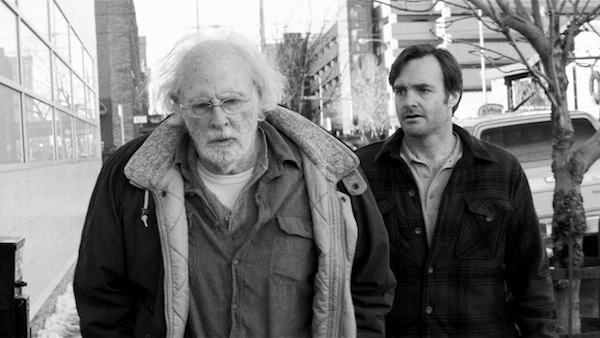Nebraska Review
Nebraska is Alexander Payne‘s most prickly movie since Election. Thematically, it more closely resembles his later, more humanist films—The Descendants, Sideways. But there’s an edge (a dull edge, but an edge nonetheless) that holds the viewer at arm’s length—until it relents and you give it a warm embrace. It took me a bit to really get into Nebraska, but when I fell for it, I fell hard. It’s an intensely relatable film about family and coming home. Packed with great performances, it’s worth mentioning among the year’s best films.
The movie opens with new millionaire Woody Grant (Bruce Dern) trudging along the side of a highway. On his way from Billings, Montana to Lincoln, Nebraska, to collect the prize a letter in the mail told him he won. It’s not his first attempted sojourn to Nebraska, and his sons—David (Will Forte) and Ross (Bob Odenkirk)—are exasperated. They’re nothing compared to his fiesty wife, Kate (June Squibb), who’s done, done, DONE with nonsense like this. She and Ross agree it might be time to put Woody in a home, but David thinks his dad just needs a jolt back to reality. Without much going on in his own life, he agrees to drive Woody to Lincoln.
You might think Nebraska is a road trip movie based on that description and its director’s history, but much more happens when Woody and David take a (necessary) detour to the former’s hometown of Hawthorne, NE. The film humorously touches on the initial awkwardness one experiences when reconnecting with extended family members for the first time in a while before moving onto issues related to legacy—its most resonant material.
Woody truly walks a fine line between knowingly aloof and frighteningly out of it, and Bruce Dern’s performance hits both states of mind with ease. He’s hesitant to reveal what he’s really thinking about this million dollar prize to his immediate family lest they shut the charade down, but to old friends he hasn’t seen in decades—friends who might otherwise pity Woody, rather than envy him—he’s got a quick tongue. David watches the entire thing spiral out of control, but he does so while connecting with his dad and watching him feel happier and more loved than he has in years. And of course, when great sums of money (even when they’re fictional) suddenly appear, the vultures start to circle. All these factors make Nebraska a deceptively complex story to tell —especially in just 110 minutes—but Payne, working with screenwriter Bob Nelson, turns it into something coherent, something that flows, and something that’s warmly funny.
Dern—who, again, is simply excellent—has earned top billing for giving the showier performance of the film’s two leads, but one could argue Nebraska is really David’s story. Forte dials down his comedic, sometimes manic onscreen persona and injects his character with exactly the right amounts of empathy and pride. He’s the only one in his family willing to give their tough-to-crack patriarch a chance, and while he recognizes a wild goose chase when he sees one, he’s not willing to let outsiders disrupt the delicate harmony he’s finally found between stubborn alcoholic father, loud gossipy mother, and disinterested brother. Because the dynamics at play are immensely relatable, it makes Forte’s grasp on David quite admirable.
I haven’t gotten to Squibb or the film’s aesthetic yet. The former provides most of the film’s humor. As you might expect, the story is sometimes quite melancholy, but certainly not when she’s around. And as far as the film’s craft credits go, Phedon Papamichael uses black and white cinematography to, successfully, give the film the feeling of something nostalgic. It’s not as rich a black and white as Frances Ha‘s was earlier this year, but it’s lovely nonetheless.
Because it takes Nebraska (and its characters) a little time to reach the destination where its most satisfying moments take place and its strongest themes take hold, you might not fall in love with film from the outset. Woody is a mostly unpleasant protagonist, and even Kate can be a grating character at times, but the places they go as a family are beautiful and make Nebraska a film I’ll treasure.
















